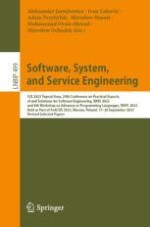2024 | Buch
Software, System, and Service Engineering
S3E 2023 Topical Area, 24th Conference on Practical Aspects of and Solutions for Software Engineering, KKIO 2023, and 8th Workshop on Advances in Programming Languages, WAPL 2023, Held as Part of FedCSIS 2023, Warsaw, Poland, 17–20 September 2023, Revised Selected Papers
herausgegeben von: Aleksander Jarzębowicz, Ivan Luković, Adam Przybyłek, Mirosław Staroń, Muhammad Ovais Ahmad, Mirosław Ochodek
Verlag: Springer Nature Switzerland
Buchreihe : Lecture Notes in Business Information Processing
